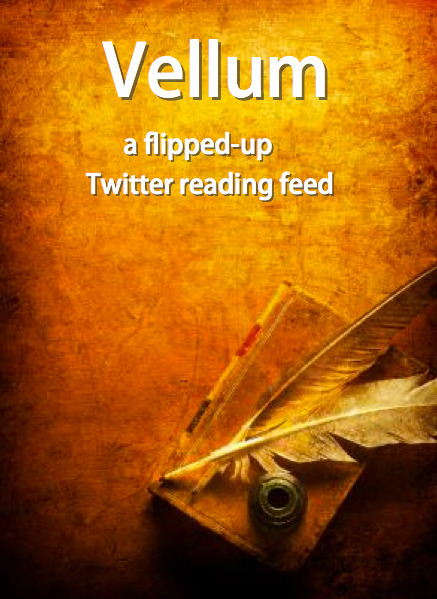
|
Scooped by Robin Good |
If you find tracking news on Twitter a difficult task due to the amount of stories showing up, and the often missing context helping you understand the value and relevance of what is being shared, here is a new tool that may help you quiet down the visual noise and find more rapidly what is really important.
Vellum is a new free web app born out of a quick experiment at the New York Times R&D labs which allows you to see all of the most relevant Twitter stories coming from the people you follow, stripped of their commentary and showing their original title, description and source.
Vellum filters out text only tweets that contain no links and surfaces only those tweets that have already been retweeted by multiple people in your network.
"Vellum acts as a reading list for your Twitter feed, finding all the links that are being shared by those you follow on Twitter and displaying them each with their full titles and descriptions.
This flips the Twitter model, treating the links as primary and the commentary as secondary (you can still see all the tweets about each link, but they are less prominent).
Vellum puts a spotlight on content, making it easy to find what you should read next.
We also wanted to include signals about what might be most important to read right now, so links are ranked by how often they have been shared by those you follow on Twitter, allowing you to stay informed about the news your friends and colleagues are discussing most."
An excellent news discovery tool for content curators.
Useful. Easy. Free. 8/10
Free to use.
Try it out now: http://vellum.nytlabs.com/mylinks
More info: http://blog.nytlabs.com/2014/04/25/vellum-a-reading-layer-for-your-twitter-feed/
See the etymology of the word Vellum



 Your new post is loading...
Your new post is loading...

















app developed by @nytlabs
Vellum acts as a reading list for your Twitter feed, finding all the links that are being shared by those you follow on Twitter and displaying them each with their full titles and descriptions.
This flips the Twitter model, treating the links as primary and the commentary as secondary (you can still see all the tweets about each link, but they are less prominent).
Vellum puts a spotlight on content, making it easy to find what you should read next.
Test 4